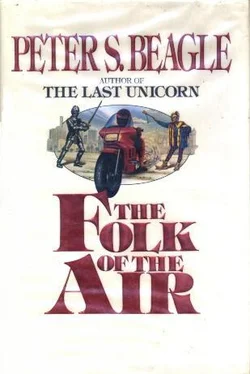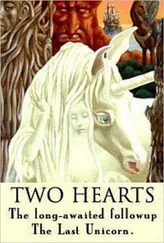There is not a chance in that world that you would have known what to do , Sia said. Farrell glanced quickly around for Briseis, but the dog was gone. The stranger was speaking to him directly now; it sounded savagely questioning, probably something about my executor, or which afterlife program I’m signed up for . He fell back on his oldest schoolyard gambit, a shrugging, smiling face meant to indicate simultaneous incomprehension and absolute agreement, combined with utter nonaggressiveness. He had never known it to fail, except with Lidia Mirabal’s boyfriend Paco, and with Julie.
The next thing he was sure about was being on the ground, unable to breathe. A raging, hammering weight was aboard him, a crowbar forearm crushed his throat, and a sound like trees splitting in a great storm was going on somewhere quite near. Dazed, frantic, he got a knee up into the center of the sound, and the strangling pressure eased slightly. As loudly as he could under the circumstances, he yelled, “Ben!”
A hand scrabbled over his face, feeling for his eyes. Farrell knocked it away, grabbing out wildly himself. His mouth and nostrils were full of musty corduroy, and he felt as though Mr. Ngugi were using him for a fly-switch, but he dug and twisted and worried, still coughing Ben’s name, until the stranger grunted and reared up astride him. The wide, rather flashy green tie, the one I gave him for his birthday , dangled askew, yanked loose from the torn collar into a knot the size and shape of a Brazil nut, surely never to be undone again. Absurdly, the tie terrified Farrell completely, in a place where the insane assault itself could not go, but it also wrenched him at last to understanding. Poor sonofabitch couldn’t get it off, just panicked. Must have thought it was witchcraft, a curse, poor sonofabitch .
“Egil, goddamn it!” he cried, but the berserker only mumbled to himself, turning his head to left and right. Farrell saw where he was looking, heaved wildly with the free upper half of his body, and lunged for the stone lying between two redwood roots. His hand closed on it, but the other took it away from him, almost gently, poising it over him, cocking it so far back that it disappeared behind the corduroy shoulder. Raising his own arms to ward it off, he shouted his old high-school nickname for Ben straight into this empty and blazing hero’s face. “Rubberlips! Hey, Rubberlips!”
The stone faltered, started down again, then hung in the air, quaking daintily, like a wind chime. Farrell said, “Rubberlips?” and saw the face begin to buckle and slip, melting into the face of their childhood, soft and wise and secret, the scar dissolving like a star at sunrise. Farrell closed his eyes, out of pity and a kind of numbing propriety— I shouldn’t see this, it’s not right —but even then, he felt Ben’s return to the body that still pinioned him, in the same way that he could always feel morning moving up across his blankets, warming his dreams.
“Joe.” The voice was small and parched.
A root was grinding into Farrell’s back, and he became aware of sweat sliding out of his hair, delicately maddening as fly feet. He sat up as Ben got clumsily off him, swiped at his forehead, and said mildly, “Seizures, my ass.”
In the same unfamiliar voice, Ben said, “I’m sorry.” Farrell had begun to brush off his uniform, but found himself tidying Ben’s torn, dusty clothes, even trying to do something about the hopelessly jammed tie. “Could have goddamn killed me,” he said, muttering like an irritated nanny as he worked. “Seizures. He could have goddamn killed me.”
“He didn’t know you,” Ben said. “Egil doesn’t know anybody in this world. Except Sia.” Now, suddenly, he was insubstantial, a figure of slowly pulsing ash; the wild power out of time that had answered Farrell’s touch a few minutes before seemed to have abandoned Ben completely, taking the marrow of his bones away with it.
Farrell said, “This is Tuesday. You’ve got a one o’clock class.”
“I do? How’m I doing?” It was the punch line of an ancient vaudeville joke, as much a part of their shared history as music or the Staff Suit they had taken turns wearing on dates long ago. Ben said, “I think I was looking for you. I never remember. How did you find me?”
Farrell told him, and he nodded. “You figure it out about Briseis yet?” He appeared to take silence for affirmation. “Sia used to have griffins for her familiars—panthers, phoenixes. Hell of a comedown to a hysterical dog with a morale problem, but Briseis does all right. In the house, she’s just a hassock with fleas—outside, she’s Sia’s eyes and legs, more than that sometimes. Old Briseis. I belong to Sia, like her, and she has to help me, but she is scared absolutely shitless of Egil. Makes things hard for her, poor old bunny.”
Farrell came across the forgotten bag of peanuts in his pocket and offered them diffidently. Ben tore the bag out of his hands and then tried very hard to eat the peanuts slowly. Farrell said, “Jesus. Wait, I’ve got some more loose ones somewhere.”
Ben looked up when the peanuts were gone, saw Farrell watching him, and smiled amost cheerfully. He said, “Egil will not eat in this world. One of those things you never anticipate.”
“I’ll buy you lunch,” Farrell said. “We have a cafeteria, everyone calls it the Elephants’ Graveyard.”
But Ben shook his head, saying, “No, let’s walk. Please, let’s just walk a little.”
Farrell put an arm around his shoulder, and for an instant Ben rested totally against him, making Farrell remember how the boy Joshua had slept in Nicholas Bonner’s arms.
They walked very slowly back up the path, which vanished under candy wrappers after it circled past the bear cages. Farrell matched his pace to Ben’s sidelong caution, and they moved among the baby carriages, the elderly couples, the school children harried into double lines behind their teachers, and the bright figures of older children, only half-tame, darting and patrolling like flights of tropical fish; they spoke hesitantly of dissertations, grants, departmental chairmanships and the transmigration of souls. Three boys were daring each other into leaning further and further out over the moat around the lion yard, and Farrell chased them away.
Ben said, “He’s real. That’s the main thing. Egil is a real person, right now. He lives in Norway, near a real place called Hamar, and he has a wife named Ingeborg, three children, a younger brother who lives with them, five thralls—okay, slaves—four oxen, four horses, a bunch of truly nasty dogs—”
Farrell interrupted him, resolutely ignoring his use of the present tense. “What time are we talking about? When is all this supposed to have happened?”
“Oh, late ninth century, by the clothing and the talk.” The unmistakable teaching lilt was coming into Ben’s voice. “They speak of Harald Fairhair as though he were the undisputed king, so it’s since the Battle of Hafrsfjord, whenever that really was. Iceland’s being settled, and the Danes are all over the Mediterranean. A lot of Egil’s people are teaming up with the Danes now, with Scotland and Ireland and the Orkneys pretty well picked clean. Make it 880, around there.”
They were in the aviary, standing before the battered, sinister grandeur of the marabou stork and the king vulture. Farrell had guided them there deliberately, because his supervisor was allergic to birds and rarely came near the building. Ben went on, “He owns his land, maybe a hundred acres, maybe a little less. It’s thin soil, but Egil works hard, and he’s pretty well off, probably the richest man in the area in terms of real wealth, except for the Jarl, the local lord. Fortunately, he gets on well with the Jarl, they’ve been friends since they were boys. They usually go viking together, after the harvest’s in—it’s almost a joint command by now. He’s about thirty-eight, thirty-nine. He’s a very good woodcarver.”
Читать дальше












